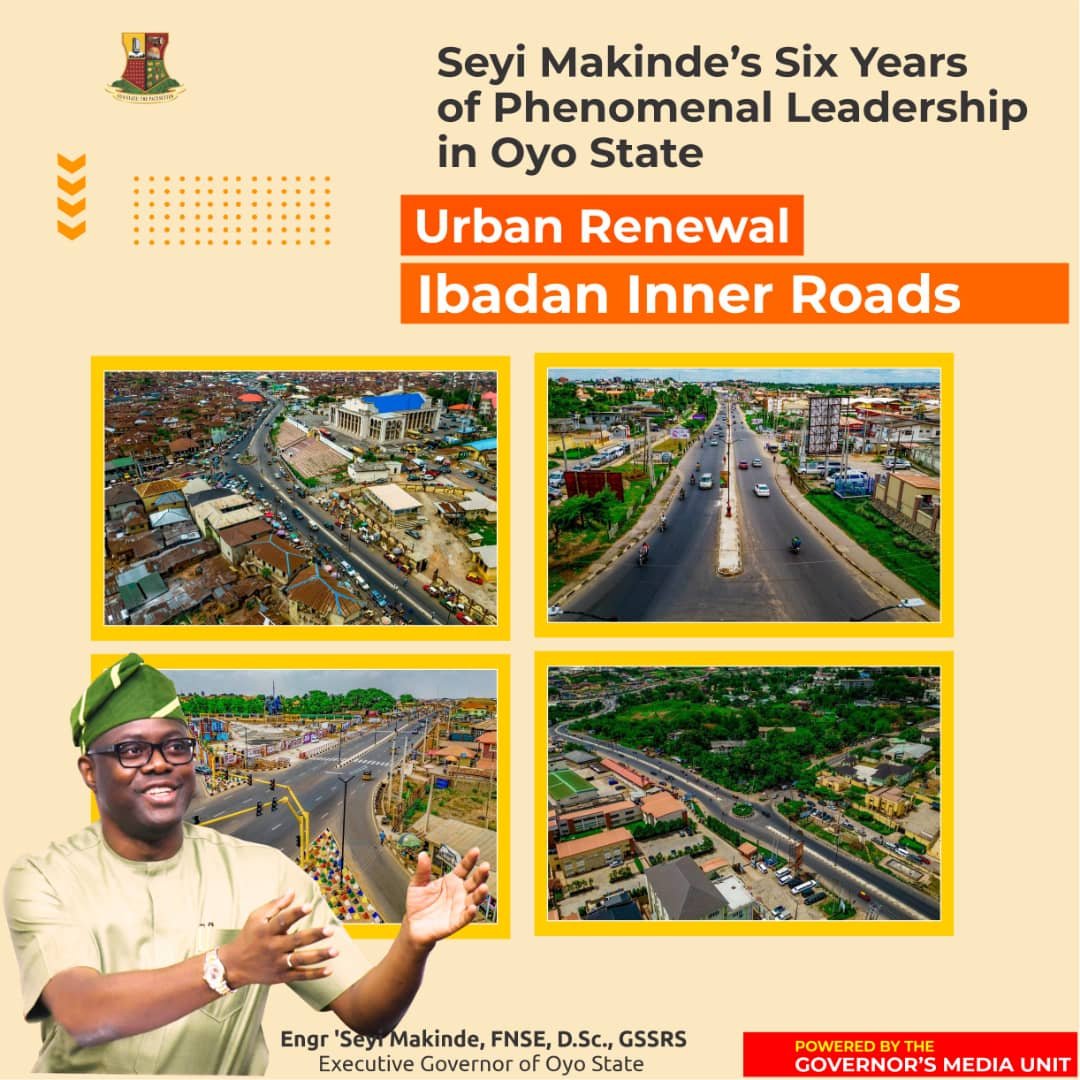By Festus Adedayo
Big calamities seldom knock before opening the door. Calamities’ sneaky essence is articulated in one song by grand old Odolaye Aremu, Ilorin, Kwara state-born Dadakuada song minstrel. While philosophizing the concept of calamity, which Yoruba call “eemo”, Odolaye sang that surprise and swiftness are primary features of calamities, holding tight to them like leeches. So he sang, “Peki laa k’eemo,” (calamity is met suddenly). The singer points at horses used in races and in ancient wars meeting their end unprepared during races. It is the same with soldiers who mount horses and ride them to death. Odolaye sang that, as sudden death pounces upon warhorses, so also do buffalos meet their end in the treacherous thickets of the savannah.
Last week, though not racing on horses nor does it have anything in similarity with buffalos, calamity swiftly walked into the capital of Oyo state and like Odolaye aptly dissected it, it was sudden. It came with its handmaidens – weeping, wailing and gnashing of teeth. Residents of Bodija, Ibadan, suddenly heard a late evening loud bang which reverberated around many parts of the ancient city. By the time the bang settled, lives had been lost, property destroyed and Ibadan suddenly became an epicentre of bad New Year news. Buildings were reduced to rubble, vehicles destroyed and a yet-to-be-ascertained number of people killed by the explosion.
Preliminary investigation found out that this calamity was the handiwork of some Malian miners who lived there. They had allegedly brought in high-level dynamite into a human neighbourhood. As at the time of writing this, official sources put the number of dead at five while excavation of bodies was still being done. One of the dead was said to be a United Kingdom returnee who met his untimely death while visiting. Mining activities have become harbingers of “eemo” in Nigeria’s lucrative mining fields, Zamfara state being an earlier example. In this state, foreigners perch on gold sites like bees on nectar with its attendant incubation of banditry.
Still on the sneaky bang of calamities, Abuja, the Federal Capital Territory, also witnessed an implosion in the number of kidnapped persons. From January 2021 to June 30, 2023, 40 kidnap cases were said to have been recorded in the FCT, with heart-wrenching 236 victims. The modus operandi of the kidnappers has today witnessed a mutation. Before now, waylaying commuters on the highway and ferrying them into the bush to demand ransom was the style. Today, under President Bola Tinubu, kidnappers have gone haywire. They are daring and disrespectful of Abuja as Nigeria’s seat of government. So, kidnappers boldly walk into people’s homes to cart away their victims without batting an eyelid.
Nigeria is under the siege of bandits who have terrorised the country non-stop, castrating the government’s expected proactive interventions and reducing successive governments to, in the words of Yakubu Dogara, mourners-in-chief. On the Abuja–Kaduna highway last week, about 30 people were said to have been abducted at Dogon-Fili near Katari, along the Kaduna-Abuja highway in Kachia local government area of Kaduna state. Eleven other persons were kidnapped in the Dutse-Alhaji area of the FCT, Abuja. Those who dispensed “eemo” to these fellow Nigerians and their families were gunmen dressed in the camouflage of military men, while the kidnappers dressed like herders.
The most pathetic and tear-jerking narration from the Dutse-Alhaji kidnap came from Oladosu Ariyo, lawyer and father of a slain 13-year-old. In an SOS that brimmed with frustration, pain and sorrow, Ariyo wrote to the Nigerian Bar Association to narrate the calamity that suddenly walked into his dwelling place. He narrated how the band of kidnappers invaded Sagwari Layout Estate in Dutse and kidnapped his lawyer wife and four children. They promptly demanded N60 million ransom. Being able to pay only a small percentage of the ransom, the kidnappers killed his firstborn and dumped the corpse on Kaduna Road. They threatened to kill the three other minor children and his wife if the whole ransom was not paid. They were said to have so far killed three of the eleven residents of the Sagwari Estate Layout in the Dutsen-Alhaji area they abducted.
The most immediate issue that the kidnaps evoke, bringing to the fore, is the disconcerting reality that kidnappings have gone outside the grips of the Nigerian government. Often orchestrated by persons who don military uniforms and inflict havoc recklessly for hours on citizens, this calamity has persisted since the Muhammadu Buhari government. It was often followed by official denials, especially during the Buhari era. That government was a seeming legitimisation of the infliction of violence and death on the people. States that border and surround the FCT like Niger, Kogi, Nasarawa and Plateau states had been hotbeds of kidnaps and wanton killings since the Buhari government. In saner climes and environments, this proximity is enough indication and foretell of imminent preying on the FCT by the bloodthirsty hounds called kidnappers and bandits. For a proactive and sensitive national security apparatus, a mechanism to arrest the imminent descent on Abuja ought to be on the drawing board, even before they struck. Unfortunately, in Abuja, unlike many civilised cities of the world, there are no statistics of ingress and egress into and outside the national capital. In the same vein, the census of landlords who live in the various suburbs of the city remains an illusion.
The issue of absence of governance is the cause of the spike in insecurity in Abuja and other parts of Nigeria. If you bore a hole through it, you will find corruption as well. There is also no doubting the fact that national security inertia juts out as a core issue in the Ibadan blast. Why would such destructive dynamite pass through the cordon of security agencies to wreak such havoc? Apart from those issues, existential matters are also trapped in the spate of kidnappings in Abuja and the blast in Ibadan. The existential issues come in rhetorical questions. Why must it be Oladosu Ariyo and his family who were abducted that night at Dutsen-Alhaji and not other families? Why was the UK returnee who met his untimely death in the Ibadan blast the one who must die? Why didn’t he delay his journey by some days, to arrive in Ibadan after the blast? Why did that calamity zero in on those who died? Why was Bodija the scene where the dynamites must explode and not elsewhere? These are questions that have defied satisfactory answers to humanity, science and religion. They have been asked consistently since the beginning of creation.
The above questions have procreated a set of people called fatalists who believe that human beings are helpless about the future, as well as the fortune or calamities that come to them. In Yoruba epistemology, this fatality is expressed as “ayanmo” or predestination. Its similar variant is “Kadara,” which is strictly identical to destiny. Kadara is woven around the concept of ‘Ori’ or the bearer of one’s destiny. The third of the tripod is called “Akosile” which holds that every individual’s destiny, as well as all that will happen to them in their life journey, are already written down in heaven before human beings begin to journey down to earth. An affirmation of this is mirrored in the saying “Ori yeye ni Mogun, ipin aise lo po,” which translates to mean, among the dry skulls at the Mogun shrine are many innocent heads.
The “Ori yeye…” narration, best explained by an anecdote said to have taken place a long time ago, apparently in pre-colonial Yoruba, has a few other slants different from the one below. The king of a town called Otolu had his trumpet called Kakaki stolen by persons he couldn’t fathom. The trumpet was a monarchical insignia used during ancestral festivals and was blown to announce the imminence of the festival. Upon the disappearance of the trumpet, Oba Otolu summoned his 17 servants for an explanation on the missing ancestral trumpet. Each swore his innocence but, miffed, literally spitting fire from his mouth like Sango, the king ordered the servants to be beheaded by the Ogun shrine. A few months after their decapitation, an Oba Otolu king friend in the neighbouring town apprehended two of his aides who had the trumpet and sent them to the Otolu king. Upon interrogation, they confessed that the heir to the Otolu throne, the king’s son, had handed it over to them. The king then ordered the beheading of the prince and the two culprits. As they were about to be decapitated at the Ogun shrine, pensive, the Otolu king muttered, pained about the shedding of innocent people’s blood thus, “See the number of heads of innocent persons we wrongly beheaded at the Mogun shrine!” The king was said to have committed suicide upon arriving at the palace.
So, were those 17 palace servants fated to be beheaded by the Orolu king? Was it their “ayanmo” (destiny) to die such gory, painful deaths? The Yoruba concept of the human person believes every human being has an ayanmo which can be positively or negatively manipulated by the nature of the head (Ori) that the person brought into this world. Thus, if an ayanmo is lopsided, failing in efforts, the Ori can help restructure the person’s destiny. This is why they say destiny has no remedy but Ori is the judge, “ayanmo o gb’ogun, ori l’elejo.”
Destiny, as articulated by Professor Segun Gbadegesin in his “Eniyan: The Yoruba Concept of a Person” in The African Philosopher Reader, edited by P.H Coetzee and A. P Roux., Routledge (New York, 1998) P.144, is “pre-ordained portion of life wound and sealed up on Ori”. According to him, “Human beings have an allotment of… destiny which determines the general course of life”. Bolaji Idowu, however, sees the Ori as a complete human personality who came before Olodumare (God) shortly before departing for this world. The human knelt before Him for allotment of his destiny and was open to what is called a “trimorphous conception of destiny”. This is in three and they are, Akunleyan (destiny got when kneeling to choose); Akunlegba (destiny got when kneeling to receive) and Ayanmo (irrevocably stamped on the person).
Some of these beliefs, made into proverbs, aphorisms, mores and lore are predicated on predestination. For instance, an ancient wise saying says that a tree will not fall in the forest and kill one who sits at home; and the rafter will not fall and kill the wayfarer (igi o ni da, k’o pa’ra ile; aja o ni jin k’o pa ero ona). Almost in line with this epistemology are the teachings of the two dominant religions, Christianity and Islam. They also believe that human beings are destined for some of the fates that befall them. However, as architects of their fates, human beings can tinker with their destinies through the worship of God. The third leg of this belief system is a doctrine called fatalism. Held by fatalists, they believe, without recourse to theology, that human beings are powerless to tinker with their future. They also hold that anything that happens to human beings is not within their human remit to change.
Many people have tried to examine why African leaders seem to cavalierly allow calamities to befall their people rather than taking proactive measures to ensure that they do not occur. I tend to think that this thinking by governments is an outcome of a very injurious but longstanding romance with theological submissions about calamities, as well as traditional Africa’s explanation of predestination. Data have proven that the more religiously or traditionally inclined government runners are, the sloppy it becomes for them to do the needful in safeguarding the lives of their people. The Buhari government, for instance, was so steeped in this belief in the God-ordained nature of human calamities that it firmed out the most important of its governmental responsibilities to God. Most times, it called on God to help it attack its attackers which is downright senseless.
Many events that happen in this modern age perforate some of the traditional African theses we have held for centuries. The Ibadan dynamite blast of last Tuesday is one. Contrary to a saying cited above, trees are now falling in the forest and killing people who sit in their homes; and rafters are falling, killing wayfarers in the process. The Ibadan blast attests to these. If the Tinubu government will not follow the footsteps of Buhari’s administration and thus be less fatalistic in its security architecture master plan, it should not be rocket science to exterminate kidnappers and be victorious over the menace of kidnapping. It is penny-wise pound-foolish to remove subsidy on petrol, with its attendant hardships on the people, then extend national pain by yawning while insecurity takes over the national capital. The truth is, if the FCT could be this unsafe, with information of its porosity to evildoers available all over the world, no investor would come to Nigeria.
Tinubu must urgently reduce the frequency of calamities in Nigeria by tackling insecurity frontally. By doing this, he will be redrawing the map of the sneakiness of calamities in Nigeria. Above all, he will render Odolaye Aremu’s thesis on calamity (eemo) and its suddenness (peki) irrelevant.
•Dr Adedayo is a lawyer, social critic and columnist.





























